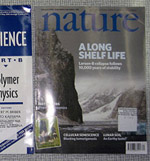Hopes for 2010: a conservation policy wish list
 Policy
Policy As a follow up to our piece, Grading Obama: a 2009 conservation policy review, we asked five leading conservation organizations about their hopes for 2010. Each organization gave us a list of policy achievements that they would like to see this year. We compiled some of their responses in a 2010 conservation policy wish list below. There is probably much more we could include.
Let us know what you think we should add...
Our sources:
Center for Biological Diversity - Advocacy organization that works through science, law, and creative media to ensure a future for all species hovering on the brink of extinction.
Land Trust Alliance - National conservation organization representing 1,700+ land trusts across U.S.
Society for Conservation Biology - International professional organization representing 10,000 members worldwide involved in the study and conservation of biodiversity.
The Wildlife Society - International scientific and educational association representing 9,100 members including wildlife professionals, students, and educators.
The Wilderness Society - Advocacy organization dedicated towards protecting America's wilderness.
2010 Conservation Policy Wish List
1) Address the Endangered Species Act listings backlog
The listing process for candidate species considered under the Endangered Species Act has historically been a slow process. While this has had much to with gross underfunding for the Department of Interior, there has been problems of foot-dragging as well. Conservationists have had higher hopes for the Obama administration. However, with 249 species on the Fish and Wildlife Service candidate list, the Obama administration has listed only two species since it took office despite more money from Congress to expedite the listing process.
Source: Center for Biological Diversity
2) Empower the EPA to address greenhouse gas pollutants under the Clean Air Act
The Environmental Protection Agency (EPA) already has substantial tools at their discretion under the Clean Air Act to require reductions in greenhouse gas emissions without Congress passing any new legislation. This includes using Section 111 to regulate greenhouse gasses as designated air pollutants and establishing performance standards (the Administration's current route). It also includes provisions in the act requiring the use of a best available control technology and using Section 155 to institute comparable international agreements. President Obama should tell congress that he will veto anything that undercuts those or state authorities.
Source: The Center for Biological Diverstiy, The Society for Conservation Biology
3) Take action to protect oceans against acidification under the Clean Water Act
As the oceans absorb carbon dioxide from the atmosphere they become more acidic, which impairs the ability of marine animals to build the protective shells and skeletons they need to survive. In 2010, The EPA will determine if and how to revise water quality criteria for marine waters to address the threat of ocean acidification. The EPA should establish water quality criteria that are strong enough to protect marine biodiversity from ocean acidification. Additionally, The EPA should identify ocean waters that are impaired or threatened by ocean acidification under the Clean Water Act; this would trigger opportunities to regulate carbon dioxide pollution that is causing seawater to become more acidic.
Source: The Center for Biological Diversity
4) Improve Endangered Species Act regulations
The Endangered Species Act has been weakened over the years and numerous improvements can be made. Particularly, the Obama Administration should restore the global reach of the consultation process as directed in the 8th Circuit Court Opinion in Lujan v. Defenders of Wildlife (1990) with assistance from agencies with significant international programs related to endangered species or their ecosystems.
Source: The Society for Conservation Biology
5) Increase funding for the Forest Legacy Program and other forest conservation programs
The Forest Legacy Program preserves working forests by conserving open space, wildlife habitat and clean water while allowing for sustainable timber harvesting. In addition, the Wilderness Society will be working with Congress and federal agencies to obtain more funding for forest restoration including road decommissioning and the increased use of controlled burns.
Source: The Wilderness Society
6) Fully fund the Land and Water Conservation Fund
The Land and Water Conservation Fund (LWCF) takes money collected from and oil and gas leases and uses it to buy and protect land. Currently, however, the fund is only getting one third of the amount it is supposed to receive each year. The Great Outdoors America Report calls for full and dedicated funding for the LWCF. Senators Jeff Bingaman (D-NM) and Max Baucus (D-MT) have introduced a bill to fund LWCF at $900 million – the level allowed by the original 1965 legislation.
Source: The Wilderness Society, Land Trust Alliance
7) Pass comprehensive climate change legislation
Congress should pass comprehensive climate change legislation that reduces greenhouse gas emissions and allocates a percentage of the revenue generated through the auction of emissions credits to a natural resource adaptation program to mitigate the effects of climate change on fish and wildlife at both the state and federal level. The government should also allocate more funding for research and development that will examine the effects of climate change on the U.S. and what else can be done to help the country respond to the problems it poses.
Source: The Wilderness Society, The Wildlife Society
8) Restore jurisdiction of the Clean Water Act
Congress should pursue legislation to restore the jurisdiction of the Clean Water Act by clearly defining “waters of the United States” and restore federal protections lost after key Supreme Court decisions in 2001 and 2006.
Source: The Wildlife Society
9) Strengthen federal laws controlling the importation of invasive species
Federal laws such ast the Lacey Act that control the importation and spread of invasive species should be strengthened to discourage additional introductions, include strict husbandry standards for invasive species already present in agricultural diversification programs to prevent their accidental escape into the wild, and include programs to monitor and control invasive species capable of modifying native wildlife habitat and affecting biological diversity.
Source: The Wildlife Society
10) Make the enhanced tax incentives for conservation easements permanent
Between 2006 and 2009, an enhanced tax incentive for conservation easement donations opened the door to voluntary, landowner-led conservation on millions of acres of important wildlife habitat and scenic open space across the state and country. Despite support from 265 Representatives (H.R. 1831), 40 Senators (S. 812) and both the incoming and outgoing administrations to make the incentive permanent, it was allowed to expire on December 31st.
Source: Land Trust Alliance
11) Ratify the Convention on Biological Diversity and other treaties
Only the United States, Somalia, Andora, the Vatican, and Iraq have failed to ratify the Convention on Biological Diversity and thus have no vote in its deliberations. The U.S. should ratify the treaty along with the United Nations Convention on the Law of the Sea (UNCLOS).
Source: Society for Conservation Biology




Reader Comments